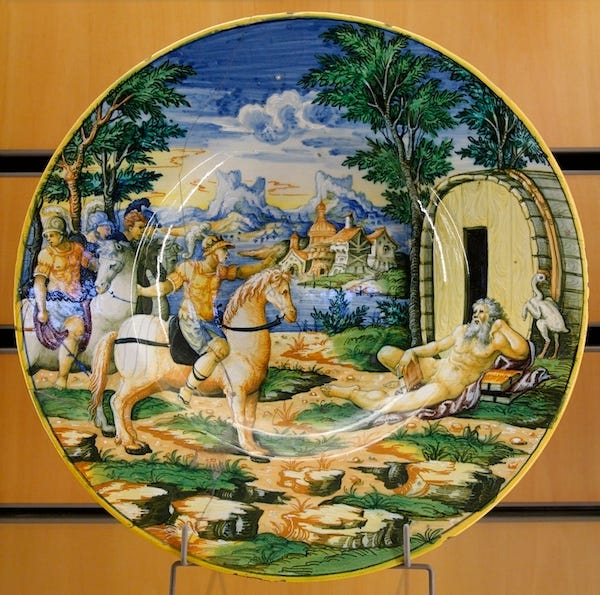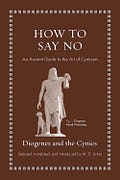How to say no with Diogenes and the Cynics
Part V of the Ancient Wisdom for Modern Readers series
[Based on How to Say No: An Ancient Guide to the Art of Cynicism, by Diogenes of Sinope et al., translated by M.D. Usher. Full book series here.]
Plato and Diogenes the Cynic famously didn’t get along. The story goes that Plato attempted to arrive at a definition of “man,” coming up with something along the lines of “an animal that is bipedal and featherless.” Diogenes showed up with a chicken from which he had plucked the feathers and triumphantly declared: “Here is Plato’s man.” Talk about exploiting the power of sarcasm in order to make a point. Plato, for his part, referred to Diogenes as “Socrates gone mad,” which, in a rather backhanded way, may be considered a compliment.
How to Say No: An Ancient Guide to the Art of Cynicism, translated by M.D. Usher for Princeton Press’s Ancient Wisdom for Modern Readers series, features the well known antics of Diogenes of Sinope, but also profiles a number of other Cynics, arguably the most maddening and interesting of the schools of Greco-Roman philosophy. One of a kind, one might justifiably say.
Cynicism did have a direct connection with Socrates, as the founder of the sect, Antisthenes, was a student of sage from Athens (and, interestingly, of the Sophist Gorgias.) Cynicism shared with a number of other Hellenistic philosophies the notion that we should “live according to nature,” though the Cynics certainly took that motto far more literally than either the Stoics or the Epicureans.
For all three schools Nature is our guide in ethical matters (so much for Hume’s idea that one can’t derive an ought from an is!). The Epicureans meant by this that it is natural, and fundamental, for humans to seek pleasure and stay away from pain, the two crucial precepts of their philosophy. The Stoics understood human nature as that of a rational and social animal, and therefore taught that a good human life is one in which we strive to use reason in order to improve our relations with others. The Cynics, though, went further and developed a highly minimalist life style according to which very few, if any, things are necessary for human welfare and, most importantly, most social conventions get in the way of a virtuous existence.
Hence famous episodes in Diogenes’s life, as when he gets mad at himself after he observes a young man drinking from a fountain with his cupped hands. He throws away the drinking cup he was carrying in his knapsack muttering that even a youth was wiser than he himself had managed to become. Or when Diogenes offends his fellow citizens because he masturbates in public and, when reproached, replies that he wished his hunger also went away by a simple rub of the appropriate bodily part!
“Cynic” means dog-like, from the Greek word kuōn. It was, of course, meant as an insult. But the Cynics took and run with it, wearing the nickname with pride and acting like dogs, barking criticism at the unvirtuous, and even biting back especially obnoxious people. But all in a rather playful way, as their goal was to teach humanity how to live eudaimonically, not to be vicious or unpleasant for the hell of it.
As M.D. Usher, the translator, reminds us, the Cynics were not philosophers in the sense of being scholars, and they hardly wrote anything down (except that they invented a whole genre of satire). Rather, they joined in the multicultural tradition of Socrates, Jesus, and Buddha, engaging in oral teachings and a particular conduct of life, leaving it to others—admirers or detractors as they may be—to chronicle them for posterity. Let’s call them performance philosophers, in analogy with modern performance artists.
For the Greco-Romans in general philosophy was not just a scholarly pursuit, it was first and foremost a way of life, and this includes highly theoretically-inclined figures like Plato and Aristotle, never mind the much more obviously practical Stoics and Epicureans. But the Cynics certainly upstaged all of the others in terms of actually living their philosophy. As Usher puts it, they anticipated the modern minimalist movement and Marie Kondo has nothing on them.
Of course, it’s easy to get caught up with the most outrageous and shocking behaviors of the Cynics, especially their unquestioned champion, Diogenes. But if we want to learn something valuable from them, something we might be able to apply to our own lives in the 21st century, we should focus not on their specific practices, but rather on the underlying mentality. Here are five basic lessons that we may want to reflect on and try out for size:
1. Learn from, and respect, Nature
In one episode Diogenes observes the behavior of a mouse and notices that the animal is not afraid of the dark, does not appear to be anxious about finding a place where to sleep, nor is he going after so-called pleasures. Diogenes inferred from this mini study in natural history that he too already had at his disposal all the resources he needed to deal with whatever life might throw at him, resources that were given to him by Nature herself.
Today we are much further remote from Nature than the Greco-Romans were, alienated might be a more accurate descriptor. As a result, not only we keep engaging in futile pursuits that keep failing to make us happy, but have lost respect and awe for Nature, and have no compulsion engaging in its destruction while pursuing pleasure and profit. Let us mindfully step back and pay more attention to the fact that we are animals ourselves, products of Nature, for whom living without Nature is impossible.
2. Separate needs from wants
Nowadays we are told that we “need” this or that consumer product in order to be happy. And so we keep buying smartphones, cars, houses, or whatever. This whole shebang is based on a confusion of needs and wants, leading to gross mistakes about what we should prioritize in life.
It turns out that, thanks again to Nature, we actually need very few things. The rest are wants. And such wants are optional, not crucial. The Epicureans wisely distinguished pleasures that are natural and necessary (food, shelter), those that are natural but not necessary (gourmet food, a large house), and those that are neither natural nor necessary (almost everything you see advertised on television, newspapers, and social media). Indeed, adopting an Epicurean, Stoic, or Cynic mentality is decidedly anti-consumerist. Which is a good thing.
3. Aim at de-growth
Consumerism is a fundamental feature of Capitalism, an approach that adopts the same philosophy as that of a cancer cell: perennial growth. We know what happens to an individual who is affected by cancer. And we are doing the same to the entire planet. Even some contemporary economists and scientists have now began to recognize that we need to abandon this particular type of insanity and aim instead at a sustainable, steady economy.
The Cynics already understood the problem over two millennia ago, though of course they couldn’t have grasped the large scale, likely irreversible environmental effects that such human madness would have on the entire planet. It’s not too late to incorporate their insights into both our individual lives and our national policies.
4. Evaluate, and if need be ignore, social conventions
Social conventions are important, as they guide us through our interactions with others, representing what others expect from us and how we should behave if we wish to fit in. But sometimes fitting in is not the best idea and, indeed, might be a really bad one. Societies wouldn’t make any moral progress if we always refused to question convention.
But one doesn’t have to go as far as masturbating in public to take a stance. (Indeed, I would not recommend following Diogenes in that particular practice.) For all our talk of independence and freethought, we act remarkably like sheep, hardly questioning our leaders, our fellow human beings, and ourselves. Sure, it’s common to shout at people on social media. But that’s also lazy and hardly effective. Social and political change comes from individual and organized action in the real, not the virtual world.
5. Be a cosmopolitan
The Cynics apparently invented the very word “cosmopolitan,” which literally means citizen of the world. We are all brothers and sisters, all on the same boat together. It doesn’t matter whether we come from Athens or Corinth—or Tokyo or Cape Town. We are all human beings, with the same basic needs, wants, hopes, and fears. And we ought to act accordingly.
Imagine the impact of a truly cosmopolitan ethos on a range of current problems, from wars to climate change, from immigration to social justice. And yet very few modern authors explicitly defend the notion of cosmopolitanism, one of the exceptions being the philosopher Anthony Appiah. Check out his Cosmopolitanism: Ethics in a World of Strangers.
Here are some highlights from the actual text of How to Say No, with accompanying brief commentaries:
“[Diogenes] used to say that training is twofold, one kind mental, the other physical. Physical training requires constant exercise and enables mental impressions to pass through the system easily with a view to performing virtuous deeds. The one kind of training is incomplete without the other, since good conditioning and strength form no less a part of matters that concern us, whether they involve the mind or the body.” (Diogenes Laertius, Lives of the Eminent Philosophers, book VI)
This is a whole new level of the famous phrase, mens sana in corpore sano (a healthy mind in a healthy body). Neither the Cynics nor their close philosophical cousins, the Stoics, made a distinction between mental and physical phenomena, so it makes perfect sense that they thought that mental and physical training go hand in hand.
What does such training look like? Physical exercises include fasting, for instance, or exposing oneself to uncomfortable physical conditions. Diogenes used to hug statues in winter (to practice rejection, as he put it), while contemporary practitioners take cold showers (which, incidentally, has a number of beneficial health effects). Mental practices are integral to the physical ones: what matters is not that you are fasting, for instance, but why you are fasting, so it’s about motivations, and these are aspects of your mental life. Moreover, none of the physical exercises is going to happen unless you mentally steer yourself for the discomfort.
“I urge you, however, not to engage in behaviors or a lifestyle in order to stand out, as do those whose desire is not to make moral progress in life but to be noticed. … The label ‘philosophy’ itself is despised enough already, even if one wears it modestly. … Let everything be different on the inside; let our facades agree with everyone else’s. Don’t make your toga gleam; but don’t let it be dirty either.” (Seneca, Letters, 5.1-6)
Seneca, the Stoic philosopher, had a bit of an ambivalent attitude toward the Cynics. In this passage, from one of his letters to his friend Lucilius, he appears to be rather critical of the in-your-face attitude of the Cynics. Don’t make your toga gleam, but don’t let it be dirty either. And consider that philosophy has enough of a bad reputation as it is, no need to associate the term with public masturbation.
Indeed, this passage reflects one of the major differences between Stoics and Cynics. While for the latter virtue is the only good and everything else—so called externals—gets in the way, for the former externals do have value, though such value is not comparable to that of virtue. So A Cynic would argue that a clean toga is not just unnecessary, but distracts us from the only pursuit that matters: virtue. A Stoic would respond that while virtue is indeed the only true good, it doesn’t hurt, and it’s even pleasant, to stroll by the Forum neat and clean.
“Demetrius the Cynic, a great man in my view, even when compared to the greatest, regularly makes this remarkable point: it is more beneficial to hold only a few philosophical views that you have ready to put to good use than to have learned many arguments that you don’t keep close to hand.” (Seneca, On Benefits, 7.1-2)
This second passage from Seneca clearly contrasts with the previous one. Here he is praising a Cynic philosopher, Demetrius of Corinth (31-71 CE). Turns out, Demetrius was an intimate friend of Seneca, so the latter’s admiration was based on personal acquaintance. There is no contradiction between Seneca’s rejection of the Cynic life style and his praise for his friend. After all, individuals are not necessarily representative of a whole class.
The advice given by Demetrius here is interesting: better to have a small number of precepts in mind that we master correctly and are ready to put into practice than to fill our heads with a bunch of stuff that we are not sure how and when to use. Practice over theory, as usual.
“You never saw him shouting or agitated or angry, even if he had to upbraid someone, for while he attacked their sins, he forgave the sinners. In this he was of the mind to model himself on the doctors who treat sicknesses but feel no anger toward their patients.” (Lucian, Life of Demonax)
The author of this passage is Lucian of Samosata (125-180 CE) who was a Syrian satirist and rhetorician. The subject is Demonax of Cyprus (70-170 CE), a famous Cynic of the time who Lucian compares to Socrates and Diogenes of Sinope.
What is interesting in this passage is the analogy between philosophers and doctors, which is found throughout the Greco-Roman tradition. The notion of condemning the sin but not the sinner, which nowadays is often associated with Christianity, was actually a standard one among the Cynics and the Stoics. Indeed, it fits much better with the latter than with the former traditions. After all, Christians believe that God gave us free will, which means that we are responsible for our actions. This in turn would make it perfectly legitimate to hate both the sinner and the sin. But Cynics and Stoics were materialists who believed in cause-effect. As Epictetus says (Discourses 1.18), what people call a thief is more like a blind man. He is affected by a sickness, and so needs help, not disdain.
“The Isthmian Games were on, so Diogenes, who was living in Corinth at the time, so it seems, went down to the Isthmus. But he did not attend the festivals for the same reasons as most people do. The masses want to watch the athletes and to eat and drink their fill. Diogenes, I reckon, went as an observer of people and their folly.” (Dio Chrysostom, Oration 9, Isthmian Discourse)
The Isthmian Games were one of a number of Panhellenic festivals, and it was held in Corinth both the year before and the year after every Olympics. The commentator Dio Chrysostom (40-115 CE) tells the story about Diogenes of Sinope going to one of these festivals in order to observe the rest of humanity, and of course to poke some fun at it!
One time Diogenes went so far as to place the victory crown on his own head, which prompted the Corinthian delegation to cry foul and ask the he be forced to remove it, since he hadn’t actually won anything. But Diogenes replied: “I have defeated many great competitors, not like these slaves wrestling here now, tossing the discus and running races, but adversaries far more formidable in every way—poverty and exile and disrepute; and more formidable still—anger and pain and desire and fear; and, the most difficult monster of all to handle—soft to the touch and festering inside—pleasure—which no Greek or barbarian can claim to have bested by strength of soul.”

[Next in this series: How to grieve with Pseudo-Cicero. Previous installments: I, II, III, IV.]






That was entertaining, motivational and practical....great read....thank you
"we act remarkably like sheep, hardly questioning our leaders, our fellow human beings, and ourselves"
...and ourselves....of all of these questioning ourselves, our own judgements, opinions etc would be the most challenging.....easy to call out others but much harder to look inside...... and as you point out that's where the work is done......
Love the story of Diogenes and the victory crown..... I could picture the whole thing..... hilarious.......
It's just my opinion, but if we spent more time looking inwards then we may just end up being more tolerant of others, knowing that we are all human beings and that none of us are perfect....
we need to focus those things which bring us together, as human beings, not divide us as if we were enemies.......seems to be happening alot nowadays....
Great article. One of the embedded links sent me somewhere and I ended up somewhere else and found that you write that one of your favorite philosophers is Bertrand Russell. I don’t recall you making reference to his works much in your writings. Are there pieces you’ve written about him you can direct me (us) to? Will you be writing more about him?